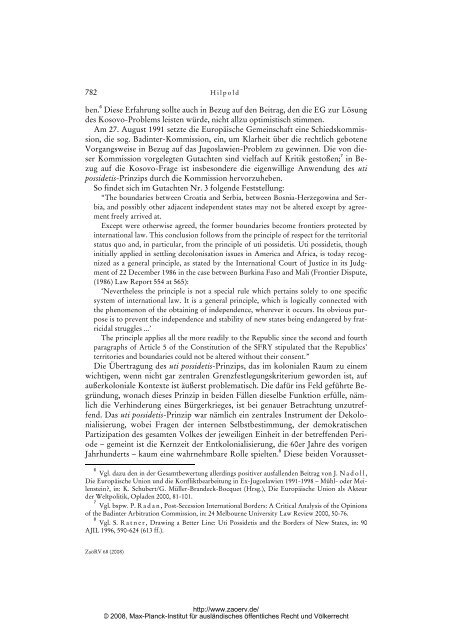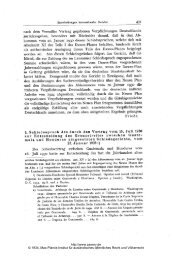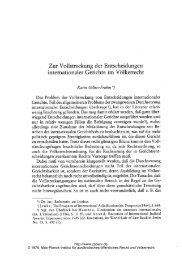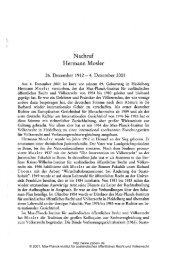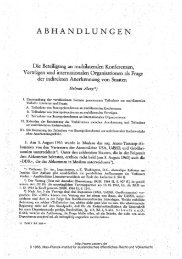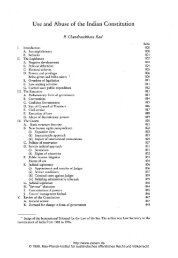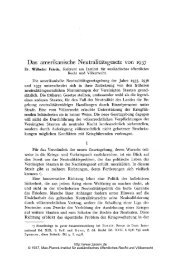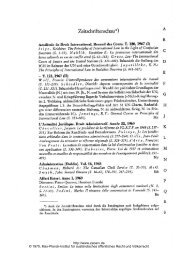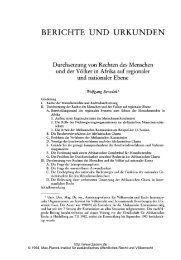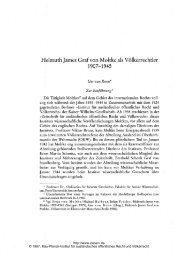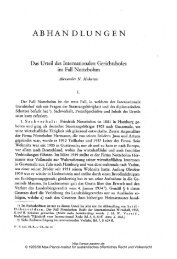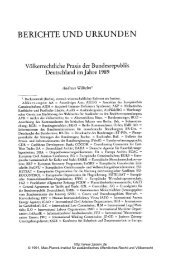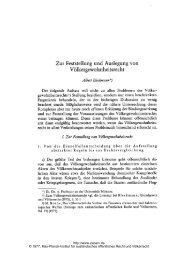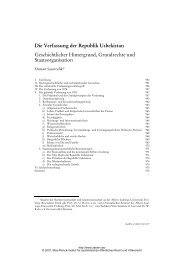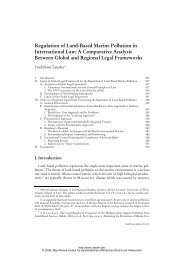Hilpold: Das Kosovo-Problem – ein Testfall für das Völkerrecht
Hilpold: Das Kosovo-Problem – ein Testfall für das Völkerrecht
Hilpold: Das Kosovo-Problem – ein Testfall für das Völkerrecht
Sie wollen auch ein ePaper? Erhöhen Sie die Reichweite Ihrer Titel.
YUMPU macht aus Druck-PDFs automatisch weboptimierte ePaper, die Google liebt.
782 <strong>Hilpold</strong>ben. 6 Diese Erfahrung sollte auch in Bezug auf den Beitrag, den die EG zur Lösungdes <strong>Kosovo</strong>-<strong>Problem</strong>s leisten würde, nicht allzu optimistisch stimmen.Am 27. August 1991 setzte die Europäische Gem<strong>ein</strong>schaft <strong>ein</strong>e Schiedskommission,die sog. Badinter-Kommission, <strong>ein</strong>, um Klarheit über die rechtlich geboteneVorgangsweise in Bezug auf <strong>das</strong> Jugoslawien-<strong>Problem</strong> zu gewinnen. Die von dieserKommission vorgelegten Gutachten sind vielfach auf Kritik gestoßen; 7 in Bezugauf die <strong>Kosovo</strong>-Frage ist insbesondere die eigenwillige Anwendung des utipossidetis-Prinzips durch die Kommission hervorzuheben.So findet sich im Gutachten Nr. 3 folgende Feststellung:“The boundaries between Croatia and Serbia, between Bosnia-Herzegowina and Serbia,and possibly other adjacent independent states may not be altered except by agreementfreely arrived at.Except were otherwise agreed, the former boundaries become frontiers protected byinternational law. This conclusion follows from the principle of respect for the territorialstatus quo and, in particular, from the principle of uti possidetis. Uti possidetis, thoughinitially applied in settling decolonisation issues in America and Africa, is today recognize<strong>das</strong> a general principle, as stated by the International Court of Justice in its Judgmentof 22 December 1986 in the case between Burkina Faso and Mali (Frontier Dispute,(1986) Law Report 554 at 565):‘Nevertheless the principle is not a special rule which pertains solely to one specificsystem of international law. It is a general principle, which is logically connected withthe phenomenon of the obtaining of independence, wherever it occurs. Its obvious purposeis to prevent the independence and stability of new states b<strong>ein</strong>g endangered by fratricidalstruggles ...’The principle applies all the more readily to the Republic since the second and fourthparagraphs of Article 5 of the Constitution of the SFRY stipulated that the Republics’territories and boundaries could not be altered without their consent.”Die Übertragung des uti possidetis-Prinzips, <strong>das</strong> im kolonialen Raum zu <strong>ein</strong>emwichtigen, wenn nicht gar zentralen Grenzfestlegungskriterium geworden ist, aufaußerkoloniale Kontexte ist äußerst problematisch. Die da<strong>für</strong> ins Feld geführte Begründung,wonach dieses Prinzip in beiden Fällen dieselbe Funktion erfülle, nämlichdie Verhinderung <strong>ein</strong>es Bürgerkrieges, ist bei genauer Betrachtung unzutreffend.<strong>Das</strong> uti possidetis-Prinzip war nämlich <strong>ein</strong> zentrales Instrument der Dekolonialisierung,wobei Fragen der internen Selbstbestimmung, der demokratischenPartizipation des gesamten Volkes der jeweiligen Einheit in der betreffenden Periode<strong>–</strong> gem<strong>ein</strong>t ist die Kernzeit der Entkolonialisierung, die 60er Jahre des vorigenJahrhunderts <strong>–</strong> kaum <strong>ein</strong>e wahrnehmbare Rolle spielten. 8 Diese beiden Vorausset-6Vgl. dazu den in der Gesamtbewertung allerdings positiver ausfallenden Beitrag von J. N a d o l l ,Die Europäische Union und die Konfliktbearbeitung in Ex-Jugoslawien 1991-1998 <strong>–</strong> Mühl- oder Meilenst<strong>ein</strong>?,in: K. Schubert/G. Müller-Brandeck-Bocquet (Hrsg.), Die Europäische Union als Akteurder Weltpolitik, Opladen 2000, 81-101.7Vgl. bspw. P. R a d a n , Post-Secession International Borders: A Critical Analysis of the Opinionsof the Badinter Arbitration Commission, in: 24 Melbourne University Law Review 2000, 50-76.8Vgl. S. R a t n e r , Drawing a Better Line: Uti Possidetis and the Borders of New States, in: 90AJIL 1996, 590-624 (613 ff.).ZaöRV 68 (2008)http://www.zaoerv.de/© 2008, Max-Planck-Institut <strong>für</strong> ausländisches öffentliches Recht und <strong>Völkerrecht</strong>


